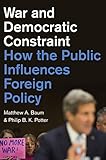War and Democratic Constraint : How the Public Influences Foreign Policy / Philip B. K. Potter, Matthew A. Baum.
Material type: TextPublisher: Princeton, NJ : Princeton University Press, [2015]Copyright date: ©2015Edition: Course BookDescription: 1 online resource (280 p.) : 37 line illus. 29 tablesContent type:
TextPublisher: Princeton, NJ : Princeton University Press, [2015]Copyright date: ©2015Edition: Course BookDescription: 1 online resource (280 p.) : 37 line illus. 29 tablesContent type: - 9780691164984
- 9781400866472
- International relations -- Decision making -- Citizen participation
- International relations -- Public opinion
- Political participation
- POLITICAL SCIENCE / International Relations / General
- Afghanistan invasion
- Downsian Premise
- Germany
- Internet
- Iraq War
- Iraq coalition
- Poland
- Spain
- United Kingdom
- United States
- audience costs
- coalition joining
- communication
- conflict behavior
- conflict initiation
- conflict reciprocation
- conflicts
- credibility
- crisis bargaining
- democracies
- democratic constraint
- democratic peace
- domestic politics
- electoral institutions
- elites
- foreign policy
- government policy
- information
- international relations
- leaders
- media access
- media coverage
- media
- military conflicts
- multiparty systems
- newspapers
- political communication
- political opposition
- political parties
- press freedom
- principal-agent theory
- public opinion
- satellite television
- threats
- troop commitment
- whistleblowers
- 327.1 23
- JZ1305 .B384 2017
- online - DeGruyter
- Issued also in print.
| Item type | Current library | Call number | URL | Status | Notes | Barcode | |
|---|---|---|---|---|---|---|---|
 eBook
eBook
|
Biblioteca "Angelicum" Pont. Univ. S.Tommaso d'Aquino Nuvola online | online - DeGruyter (Browse shelf(Opens below)) | Online access | Not for loan (Accesso limitato) | Accesso per gli utenti autorizzati / Access for authorized users | (dgr)9781400866472 |
Frontmatter -- CONTENTS -- List of Figures and Tables -- Acknowledgments -- Chapter 1. Introduction: Looking for Democratic Constraint -- Chapter 2. Democracies Are Not Created Equal: A Theory of Democratic Constraint -- Chapter 3. Democratic Constraint, the Democratic Peace, and Conflict Initiation -- Chapter 4. Looking for Audience Costs in All the Wrong Places: Constraint and Reciprocation -- Chapter 5. Willing and Politically Able: Democratic Constraint and Coalition Joining -- Chapter 6. Downs Meets the Press: How Party Systems Shape the News -- Chapter 7. Coalition Stories: Cases from the Iraq Coalition -- Chapter 8. Conclusion: Information, Constraint, and Democratic Foreign Policy -- References -- Index
restricted access online access with authorization star
http://purl.org/coar/access_right/c_16ec
Why do some democracies reflect their citizens' foreign policy preferences better than others? What roles do the media, political parties, and the electoral system play in a democracy's decision to join or avoid a war? War and Democratic Constraint shows that the key to how a government determines foreign policy rests on the transmission and availability of information. Citizens successfully hold their democratic governments accountable and a distinctive foreign policy emerges when two vital institutions-a diverse and independent political opposition and a robust media-are present to make timely information accessible.Matthew Baum and Philip Potter demonstrate that there must first be a politically potent opposition that can blow the whistle when a leader missteps. This counteracts leaders' incentives to obscure and misrepresent. Second, healthy media institutions must be in place and widely accessible in order to relay information from whistle-blowers to the public. Baum and Potter explore this communication mechanism during three different phases of international conflicts: when states initiate wars, when they respond to challenges from other states, or when they join preexisting groups of actors engaged in conflicts.Examining recent wars, including those in Afghanistan and Iraq, War and Democratic Constraint links domestic politics and mass media to international relations in a brand-new way.
Issued also in print.
Mode of access: Internet via World Wide Web.
In English.
Description based on online resource; title from PDF title page (publisher's Web site, viewed 30. Aug 2021)


